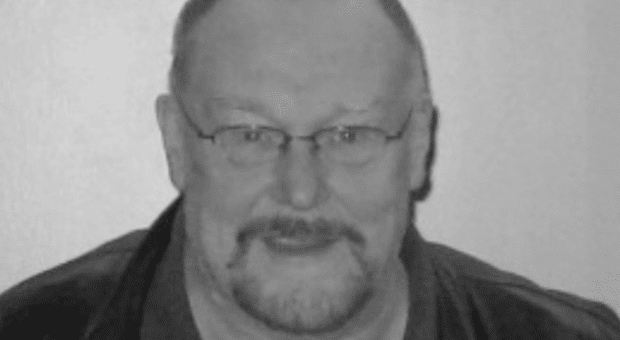Gens Hellquist, hailed as one of Canada’s pioneers of gay liberation and a passionate advocate for gay health issues, has died at the age of 66.
“Gens called it like it was. He had an enormously deep passion and he was tireless,” says McGill University adjunct professor Bill Ryan, who first met Hellquist in the 1980s when they worked together on gay health issues.
“He pushed the agenda along sometimes just through pure willpower. He never gave up,” Ryan says.
According to the Canadian Lesbian and Gay Archives, Hellquist was executive director of the Canadian Rainbow Health Coalition, a national non-profit addressing health disparities faced by queer Canadians. He was also the founding director of Gay & Lesbian Health Services of Saskatoon, now Avenue Community Centre for Gender and Sexual Diversity.
Avenue executive director Jay Richards says Hellquist had been diagnosed with cancer, but Richards was unsure if that was the cause of his death or when exactly he had died.
“We found out Tuesday afternoon,” he says.
Richards says Hellquist leaves big shoes to fill on the Canadian stage of gay activism.
“His contributions to queer activism, both at a local level and a provincial level and nationally, are profound,” Richards says. “He was a fearless warrior. He was a friend and a mentor.”
Richards says Hellquist left his mark on queer issues related to human rights and access to funding for both queer organizations and health services.
“It goes from the small pieces of going into classrooms and doing presentations to being on a national stage,” he says.
Hellquist was active in educating young people on the effects of homophobia and spoke to gay-straight alliances in schools and at universities.
Having worked in the human service field in Saskatoon since 1971, he served on the board of numerous local, provincial and national non-profits addressing homecare, literacy, volunteerism, HIV/AIDS and equality issues. He was on the Saskatoon police advisory committee on diversity and the Saskatchewan advisory committee on HIV/AIDS.
He also served on the board of directors of the Canadian AIDS Society and the Saskatchewan AIDS Network.
Hellquist was the founder and editor of Perceptions, a gay and lesbian newsmagazine published in Saskatoon, one of Canada’s longest-operating gay publications. He also wrote for The Body Politic, Xtra, Briarpatch and numerous other publications.
In the introduction to the 2003 report The Cost of Homophobia: Literature Review on the Human Impact of Homophobia in Canada, Hellquist wrote, “Marginalization has a negative impact on any community that is denied the full rights of citizenship whether it occurs because of racism, colonialization, sexism or homophobia.”
According to the online Encyclopedia of Saskatchewan, formal gay activism truly arrived in the province in March 1971 when Hellquist placed an advertisement for “Saskatoon Gay Liberation” in Vancouver’s Georgia Straight newspaper.
“Slowly, a few men and one lone woman wrote to Hellquist asking for information,” the encyclopedia says.
From that grew plans to organize the city’s gay community, the encyclopedia says, leading to the creation of the Zodiac Friendship Society, an umbrella organization devoted to gay political issues, education, counselling and support groups, and a social club called the Gemini Club.
Funds generated at weekly dances eventually led to the opening of a gay community centre in March 1973.
“The only other Canadian city to have a dedicated gay centre then was Toronto, and Saskatoon’s achievement was a point of considerable pride for local activists,” the encyclopedia says.
In 2009, Hellquist was one of six activists to tackle homophobia in Canada’s healthcare system by filing a complaint against Health Canada and the Public Health Agency of Canada with the Canadian Human Rights Commission.
“The constitution of this country guarantees equality to all Canadians in all areas, but that still does not hold for gay, lesbian, bisexual Canadians when it comes to our health,” Hellquist said at the time.
Phillip Banks, now working with the AIDS Committee of Simcoe County in Ontario, worked with Hellquist on the case.
“He was feisty and he was tenacious and not just in his local area, but across the country,” Banks says. “He fought hard for the LGBT community. He had a big impact.”
Banks says Hellquist continued his work for gay health equality long after other rights had been won.
Ryan says Hellquist’s goal for gay health issues was something akin to the national Status of Women, a federal government organization promoting equality for women and their full participation in the economic, social and democratic life of Canada.
Ryan says Hellquist was instrumental in organizing three national conferences that brought together hundreds of people to discuss gay health issues.
And, Ryan adds, Hellquist was never without a bottle of Pepsi. “In the morning, he would have it at the breakfast table,” he says. “He was emptying them throughout the day.”
Hellquist was awarded the Saskatchewan Centennial Medal in June 2005 for his years of involvement and advocacy in the queer community. In 2010, he was among 12 nominees from across the country inducted into Canada’s Q Hall of Fame.
Also in 2010, Hellquist was presented with the first Peter Corren Award for Outstanding Achievement. The award is presented annually at the University of Saskatchewan to a person, persons or organization whose efforts have had a long-term impact on social justice for sexual minorities.
Richards says Hellquist leaves two brothers and other biological family.
“He’s got his entire queer family,” Richards adds. “It literally goes from one coast to another.”
A memorial will be held at the Roxy Theatre in Saskatoon on Thurs, Oct 10 at 2pm.

 Why you can trust Xtra
Why you can trust Xtra


